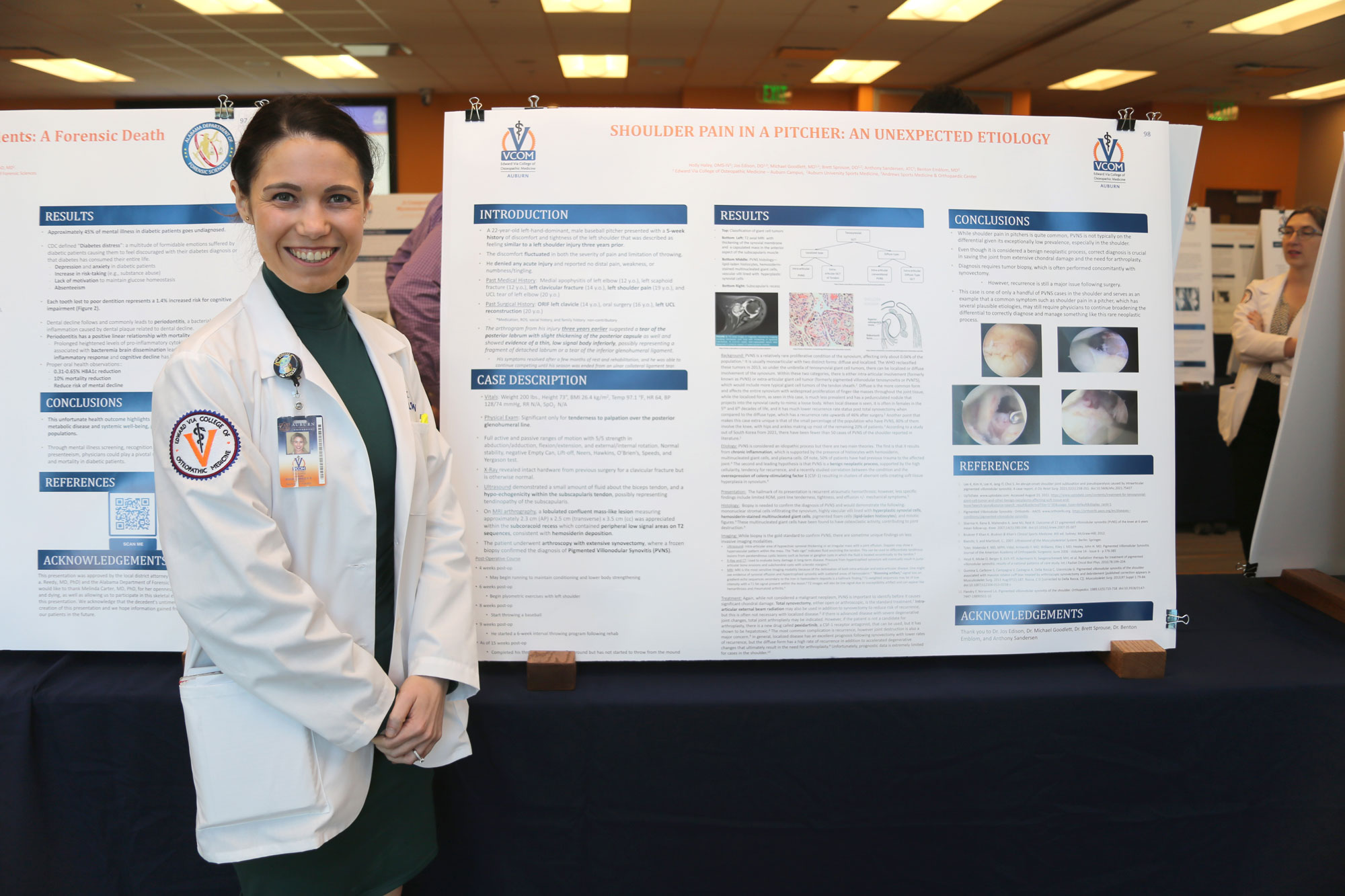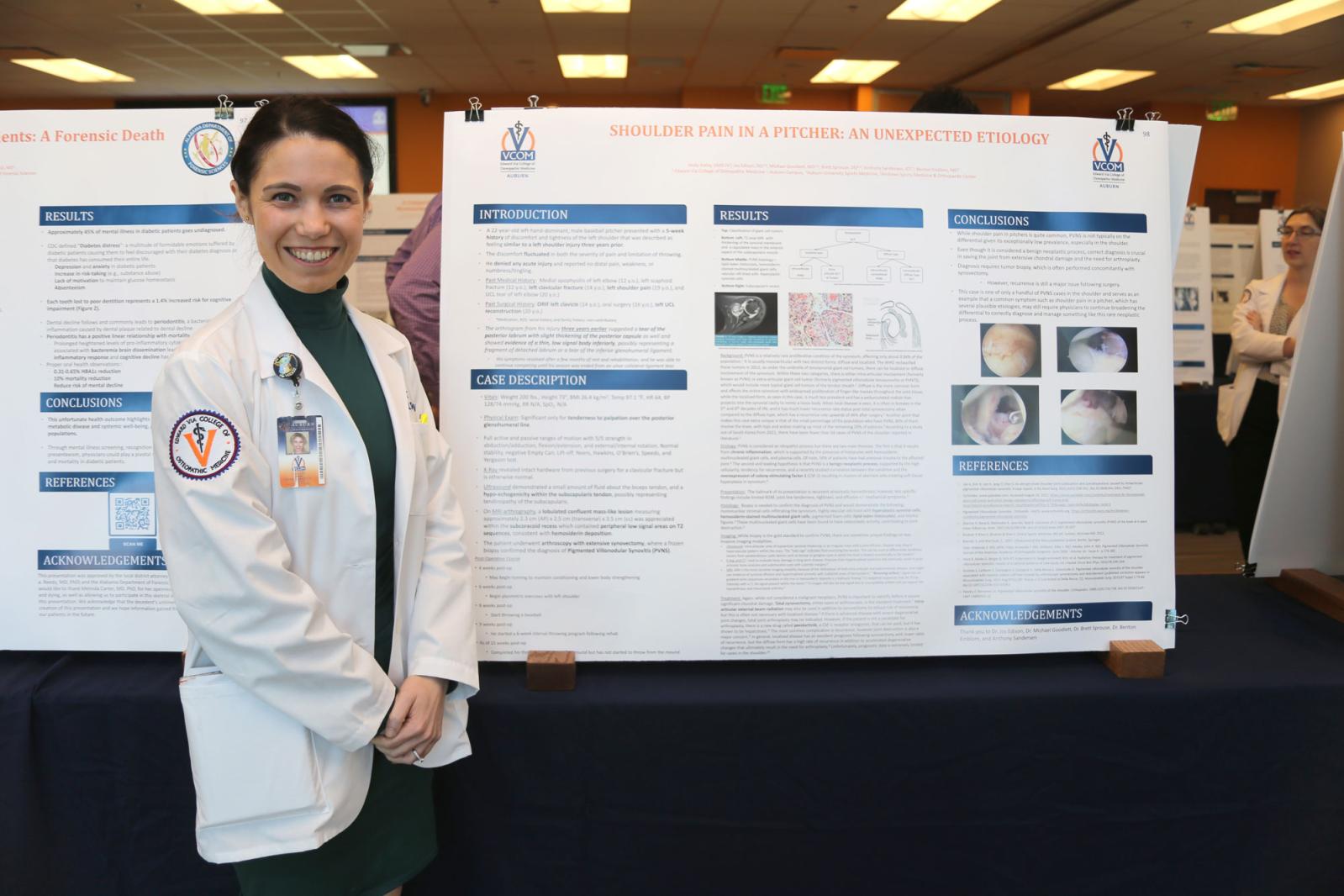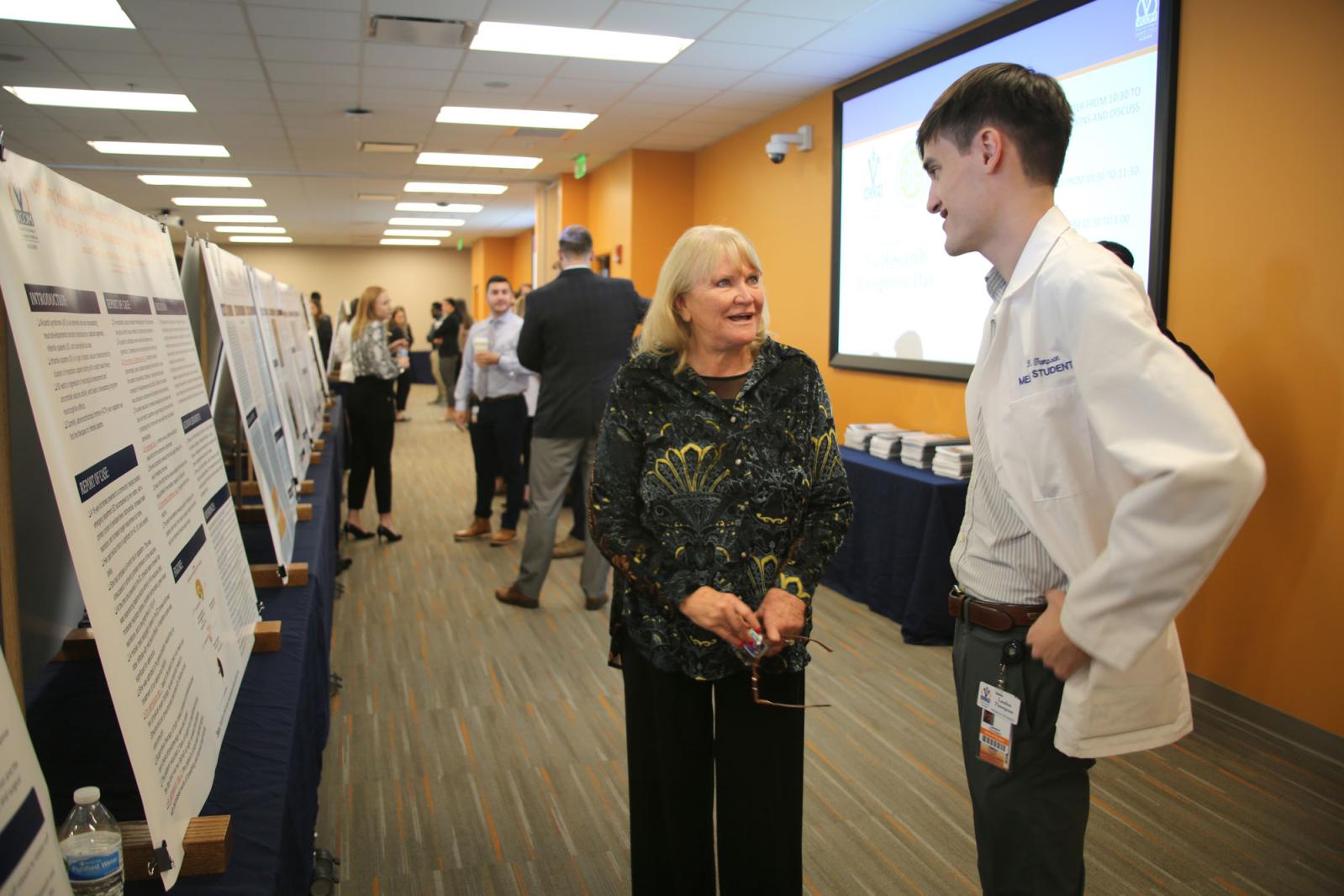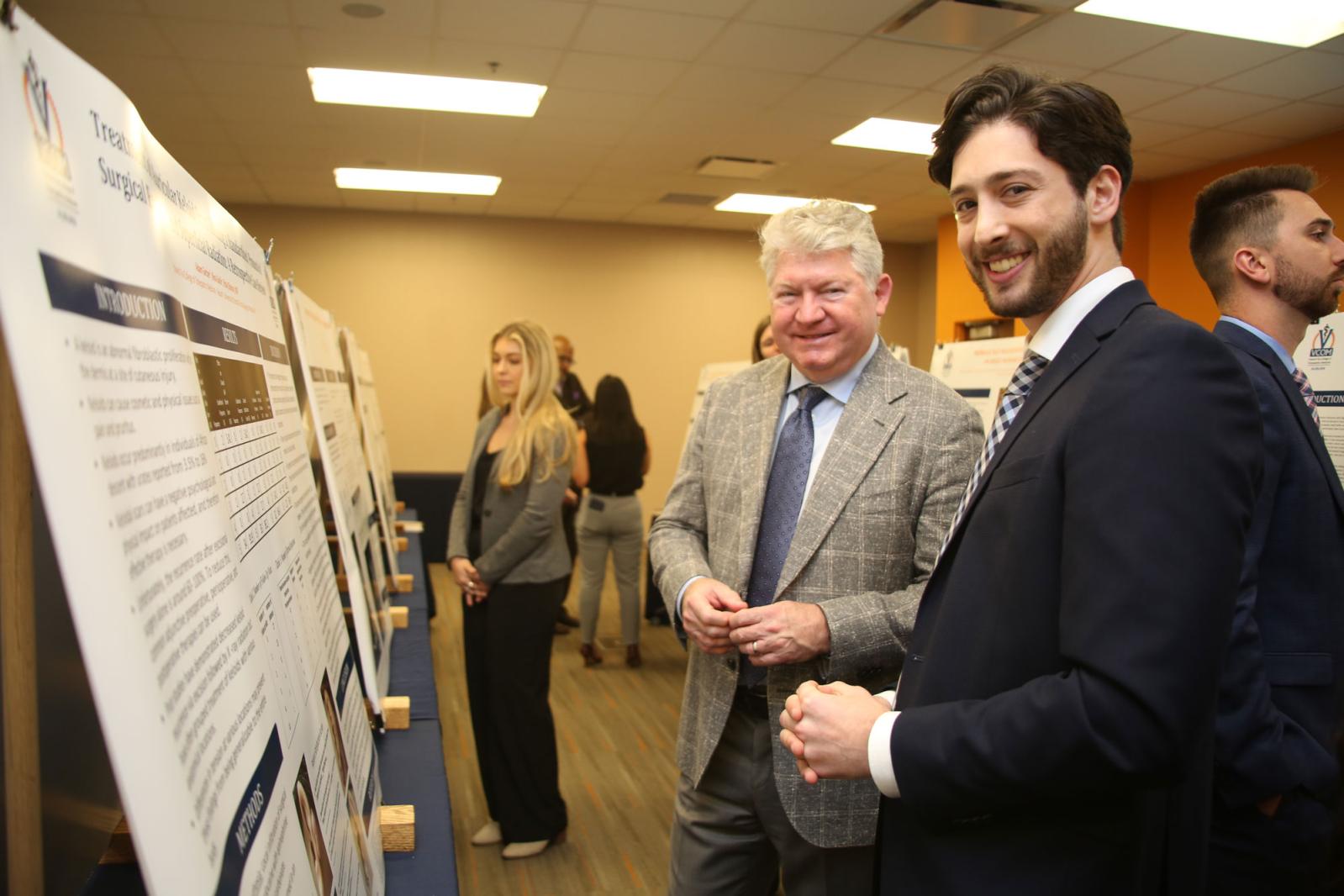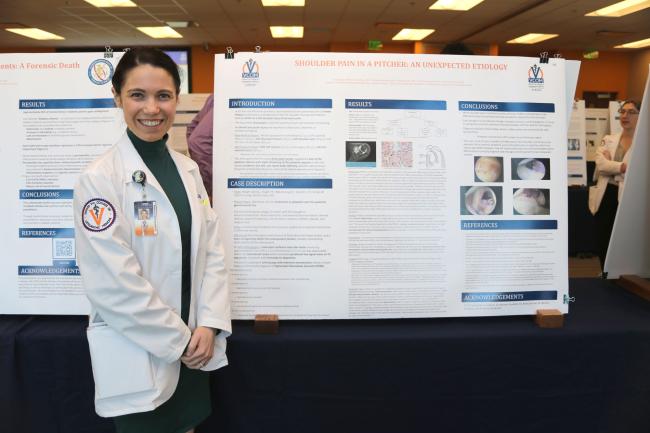
On the morning of February 3, the skies cleared, giving way to a bright, cool day. This was the sixth, and maybe the best, version of the VCOM-Auburn Via Research Recognition Day. The session convened at 9 a.m. in lecture hall two, where VCOM Vice Provost for Research, P. Gunnar Brolinson, DO, gave an overview of research efforts and initiatives at VCOM. Following Brolinson’s presentation, keynote speaker Stan Sonu, MD, MPH, gave a presentation titled: “Elephants in the Exam Room: The Long-Term Effects of Childhood Adversity and Why We Need Trauma-Informed Systems of Care.” Sonu serves as assistant professor of internal medicine, pediatrics and preventative medicine at Emory University School of Medicine and as an associate program director of Emory’s internal medicine residency program. As he started his presentation, Sonu posed a question to attendees. “What are we going to be about in medicine – treating smoke or treating fire,” said Sonu.
Sonu’s presentation involved ACES, or Adverse Childhood Experiences, a topic that he was passionate about. ACES include physical, emotional or sexual abuse and physical or emotional neglect, as well as household stress, which would include mental illness, domestic violence, substance abuse, incarceration and parental separation/divorce. According to Sonu, two out of three adults in a specific study reported having at least one ACE. Sonu noted that more ACEs typically result in exponentially higher physical and emotional health risks for individuals. Sonu stressed that babies were born plugged in for connection and that childhood was where children learn developmental skills. “Experiences after birth influence brain architecture over the life course,” said Sonu. “Early life stress has the greatest effect on child development and wellbeing,” he added. Sonu stressed that adversity was not destiny and that many people overcome odds against them. “Safe, stable and nurturing relationships promote health brain development, self-regulation and resilience,” said Sonu. “The committed, attuned presence of an adult is the foundation for healthy brain development,” Sonu added. Sonu stressed the need for caregivers to utilize trauma informed care to screen for trauma symptoms in the clinical environment. “Instead of asking someone what is wrong with you, ask what has happened to you,” said Sonu. “A patient can relate to a doctor if they feel the doctor understands them,” Sonu said. As he closed his presentation, Sonu encouraged students to consider starting an ACE and trauma informed care interest group at VCOM-Auburn. Additionally, he pointed audience members to a free, online course from Brown University about trauma informed care during the physical exam.
Following Sonu’s presentation, two poster sessions were held in a packed MPR on the first floor, which featured 100 posters!
A panel discussion was held after the poster sessions and lunch at 1 p.m. Panelists included Kimberly Klaus, PA, PhD, VCOM-Auburn OMM Discipline Chair, Jos Edison, DO, Bob Seton, PT and VCOM-Auburn Assistant Professor for Anatomical Sciences, Mary Piscura, PhD. Klaus began with her presentation titled: “The Impact of Social Determinants of Health and Trauma on Mind-Body-Spirit Unity Among Underserved Populations.” Klaus works in a safety net-style clinic, where she continually interacts with many patients with enormous life challenges. Klaus encouraged clinicians to look at patients as a whole person, listen for cues, ask questions and know their resources. “Patients want medical providers to understand them,” said Klaus. “The person in front of you is not just a disease or a trauma,” Klaus added. Jos Edison, DO, gave the next presentation, where he discussed Myofascial Pain Syndrome and efforts to reduce suffering and improve the quality of life for MPS patients. Bob Seton, PT, gave a presentation titled: “Trauma Informed Approach to Myofascial Pain Elimination.” Seton discussed his work in pain management and elimination. Seton is a co-investigator on a REAP grant with William Pearson, PhD, entitled: “Autonomic Realignment Approach to Myofascial Pain Elimination.” The last presentation during the panel was given by Mary Piscura, PhD, who also served as panel moderator. Piscura’s presentation was titled: “Conceptualizing an Animal Model to Investigate Pain Mitigation.” Piscura’s presentation discussed using animal models to investigate chronic pain.
Following a question-and-answer session for panelists, awards were given out for poster winners in each category. Additionally, VCOM-Auburn Associate Dean for Biomedical Affairs and Research, Kenny V. Brock, DVM, MS, PhD, awarded VCOM-Auburn’s Researcher of the Year Award to William Pearson, PhD.
Poster Winners
BIOMEDICAL
27 – Jackson Carlyle - An Assessment of the Nutritional Profile of Foods Accessible to Prisoners in Alabama
33 – Isabella Kammerer - Computational Analysis of Pharyngeal Swallowing Mechanics Following Stroke
13 – Karen Andrawes - Computational Analysis of Swallowing Mechanics in Dysphagic ALS Patients
37 – Rishika Pandey - Assessing Heart Rate Variability as a Reliable Indicator of Autonomic Changes Using iMotions Sensors and Software
CLINICAL CASE
22 – Cassidy Clark - A Rare Presentation of Primary Hepatocellular Carcinoma in Alabama
36 – Rishika Pandey - Developing Chronic Lymphocytic Leukemia After Remission of Chronic Myelogenous Leukemia — A Rare Case
72 – Jessica Barkhouse - An Aggressive Angiomyxoma Presenting as an Inguinal Hernia in a Biological Male
28 – Makayla Hyde - A Case Report of Fournier’s Gangrene in an Unusual Age Group
CLINICAL RESEARCH
79 – Vikhram Balagee - Central Circadian Contribution to Systolic Blood Pressure Dipping is Minimal Under Constant Conditions
23 – Cassidy Clark - Healthcare Associated Infections: How COVID-19 Impacted the Trends
15 – Aly Skoczek - Clinical Outcomes Following Robotic Abdominal Wall Reconstruction for Ventral Hernias Using Resorbable Biosynthetic Mesh
70 – John Lusk - Rapid Recovery Pathway: A Post-Operative Opioid Reducing Alternative to Epidural Catheter Analgesia for Neuromuscular Scoliosis Patients
EDUCATIONAL
62 – Berkeley Hawks - Evaluating Efforts to Promote Community Flourishing in the Gross Anatomy Lab Using the Community Flourishing Index
18 – Nancy Nguyen - Impact of an Interdisciplinary Culinary Medicine Elective to Enhance Personal Health, Knowledge, and Confidence with Counseling on Nutrition
25 – Chloe Haverkamp - The Effect of Global Health DIDACTIC Curriculum Competency of Medical Students in Core Competencies of Global Health
2 – Elizabeth Tissier - Time Until Proof of Credentials Significantly Decreases with Use of Blockchain Technology and Document Management System
SIM
38 – Rishika Pandey - 3D Additive Manufacturing Provides Equipment for Underserved Areas in the U.S. and Central America
17 – Jordan Yacoub - Additive Manufacturing System Reduce Simulation Center Expense for Lumbar Task Trainer
86 – Abigail Bogard - The Incorporation of Repetitive Practice is a Better Utilization of Standardized Patients in Medical School
14 – Karen Andrawes - Workshop Intervention Significantly Improved Medical Student Confidence in LGBTQ+ Patient Encounters
RESIDENT/GRADUATE STUDENT
First Place, Resident
1 – Lindsey Blackmon - Could Cobalt Be the Culprit
First Place, Graduate Student
95 – Nicole Anthony - The Slow/Type I Myosin in Skeletal Muscle is Regulated by Antisense Long Non-Coding RNA
